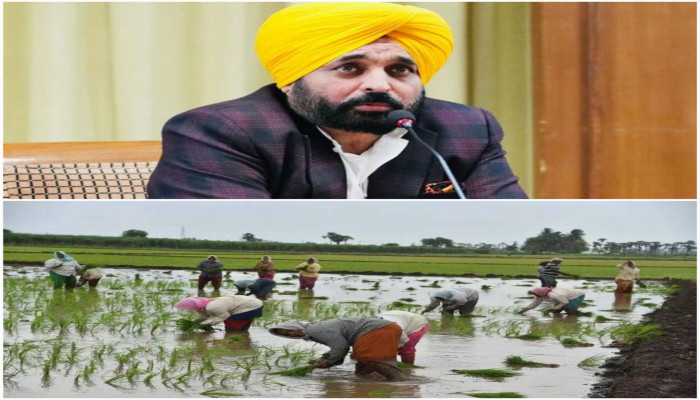Punjab government advances paddy transplantation despite expert warnings and legal obstacles
- In Reports
- 06:32 PM, Apr 23, 2025
- Myind Staff
The Punjab government stood firm on its decision to allow early paddy sowing despite opposition from agricultural scientists and a case filed with the National Green Tribunal. On Wednesday, the government officially announced that it would enable staggered paddy transplantation starting June 1. The state's agriculture department released the notice under Section 3, subsections (1) and (2) of the Punjab Preservation of Sub-soil Water Act, 2009, on behalf of the Governor.
According to the notification, direct seeding of rice (DSR) across the state will begin on May 15 and continue until May 31. Paddy transplantation will commence on June 1 in Faridkot, Bathinda, Ferozepur, Muktsar, and Fazilka districts. Starting June 5, it will take place in Gurdaspur, Pathankot, Amritsar, Tarn Taran, Roopnagar, SAS Nagar, Fatehgarh Sahib, and Hoshiarpur. From June 9, the process will start in Ludhiana, Malerkotla, Mansa, Moga, Patiala, Sangrur, Barnala, Kapurthala, Jalandhar, and Shaheed Bhagat Singh Nagar.
A group of prominent agricultural scientists and experts, including Dr. SS Johl, former Chairman of the Commission for Agricultural Costs and Prices and Chancellor of Central University of Punjab; Dr. GS Khush, World Food Prize Laureate and Emeritus Professor at the University of California; Dr. Rattan Lal, World Food Prize Laureate and Distinguished University Professor of Soil Science; Dr. BS Dhillon, former Vice Chancellor of Punjab Agricultural University; Dr. JS Samra, former CEO of the National Rain-fed Area Authority; Dr. Jai Rup Singh, former Vice Chancellor of Guru Nanak Dev University; and Kahan Singh Pannu, former Secretary of Agriculture in Punjab, have appealed to Chief Minister Bhagwant Mann to rethink the judgment to advance paddy transplantation. They warned that the move could have disastrous effects, pointing to declining groundwater levels.
Advocate Hari Chand Arora has filed a petition with the National Green Tribunal (NGT) challenging the early start of paddy transplantation. The NGT has accepted the petition, and it is expected to be heard soon. In addition, the Punjab Water Regulation and Development Authority (PWRDA) sent a recommendation to the state's additional chief secretary of agriculture on April 7, suggesting a delay in paddy transplantation in Punjab.
The PWRDA also set up a committee to research and develop water-efficient crop varieties, chaired by BS Dhillon, the former Vice Chancellor of Punjab Agriculture University. The committee has been in discussions with experts from several research institutions, including PAU, Indian Agricultural Research Institute (IARI), CCS Haryana Agriculture University, Indian Institute of Maize Research (IIMR), ICAR-Central Arid Zone Research Institute Jodhpur, ICAR-Indian Institute of Agricultural Biotechnology Ranchi, Borlaug Institute of South Asia, ICAR-Central Institute of Post-Harvest Technology, and ICAR-Central Institute of Cotton Research, Sirsa.
In its interim report, the committee made several recommendations, one of which was to delay the paddy transplantation process. To conserve water resources, the committee suggested that paddy transplanting should be timed with the arrival of the monsoon, around June 30. Transplanting begins on June 20, but the committee proposed gradually shifting the start date to June 30, with June 23 being set as the first change.
Kahan Singh Pannu, the former Secretary of Agriculture in Punjab, pointed out that although the issue was raised, the state government has not reconsidered its decision to advance the paddy transplantation. Many believe this move is contributing to Punjab's looming desertification. Given the shrinking water table, there is an urgent need to reduce the area dedicated to paddy farming and delay transplanting, making the government's decision to push the process forward, especially concerning Punjab, all the more critical.







Comments